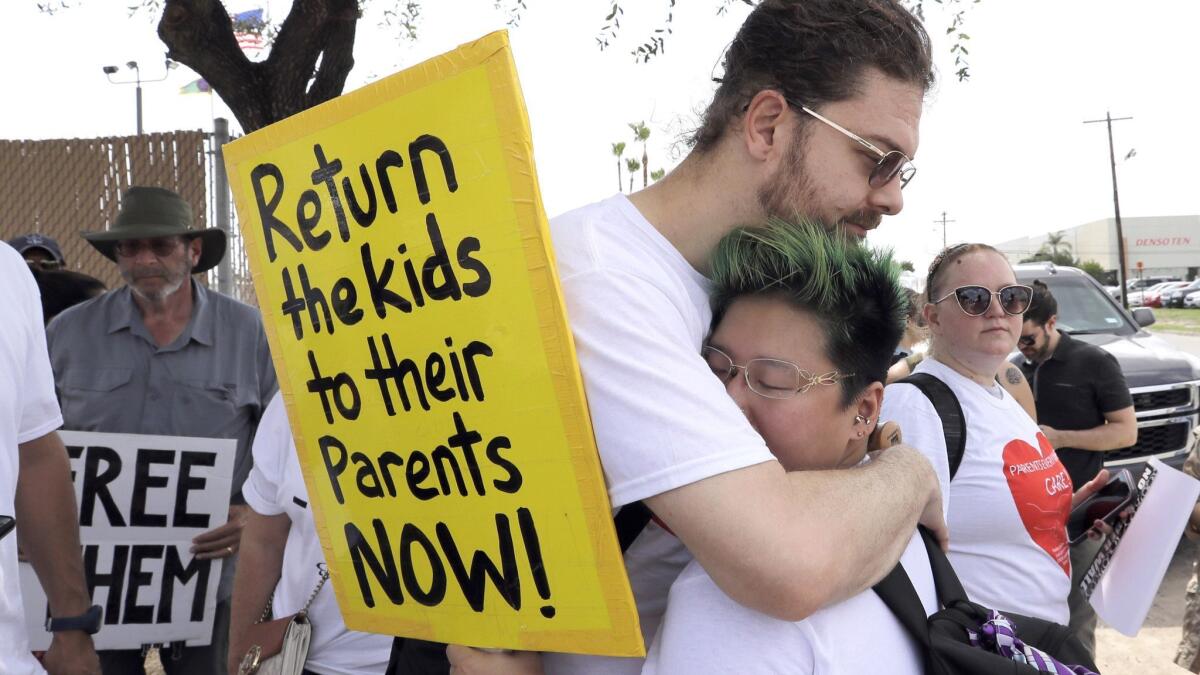Judge rejects Trump administration bid to indefinitely detain immigrant children with parents

A federal judge in Los Angeles dealt the Trump administration a significant blow Monday by rejecting its attempt to indefinitely detain immigrant children caught crossing the border illegally with their parents.
U.S. District Judge Dolly Gee issued an order lambasting the Justice Department for its request to modify a 1997 legal settlement that set rules for how the government can deal with immigrant children in its custody. Calling President Trump’s executive order on immigrants “ill-considered,” the judge accused the administration of attempting to shift blame to the courts for a crisis of Congress’ and the president’s making.
Gee’s order came as Justice Department attorneys told a federal judge in San Diego they would miss Tuesday’s deadline for authorities to reunite parents and children younger than 5 who were forcibly separated at the border.
Just over half the 102 children identified by the government will be reunited by Tuesday’s deadline, the attorneys told U.S. District Judge Dana Sabraw, who had previously ordered the reunifications in response to a legal action brought by the American Civil Liberties Union. The rest includes children whose parents were already deported, have criminal records and are unfit to care for them, Justice Department attorneys said. In the case of one 3-year-old boy, they said, authorities couldn’t find any parental records.
Despite the missed deadline, Sabraw told attorneys for both sides that he was “very encouraged by the progress” and that he was “optimistic” many families would soon be reunited.
The San Diego and Los Angeles cases will dictate how quickly and under what circumstances the administration can reunite families.
The settlement at issue before the Los Angeles judge arises from a case brought by a Salvadoran teenager in 1985. That led to an agreement that immigrant minors detained at the border be released to relatives or other custodians “without unnecessary delay” or placed in licensed facilities within five days, and during a surge, up to 20 days.
The Justice Department had asked that Gee modify the so-called Flores settlement, contending the terms made it impossible for officials to carry out Trump’s June 20 executive order to detain children with parents who faced prosecution for crossing the border illegally. The attorneys subsequently argued that in order to comply with the San Diego judge’s order that families be reunited, the government could no longer release the minors as required under the settlement.
Gee called the government’s interpretation of the settlement “tortured” and accused the administration of a “cynical attempt … to shift responsibility to the judiciary for over 20 years of congressional inaction and ill-considered executive action that have led to the current stalemate.”
She wrote that the administration was looking to work around a long-established legal agreement when it had the capability to change the policies that resulted in the current crisis of thousands of children forcibly removed from their parents.
“Absolutely nothing prevents the [government] from reconsidering their current blanket policy of family detention and reinstating prosecutorial discretion,” she wrote.
The judge said she found “dubious” and “unconvincing” the government’s contention that the settlement, in allowing the release of minors while their immigration cases are pending, caused a “surge” in border crossings in recent years by incentivizing would-be migrants. She said “any number of other factors” could have led to the increase, including civil strife, economic conditions and physical threats in the migrants’ home countries.
The judge said of utmost importance was protecting the “blameless” children who are in government custody, whom the settlement was intended to safeguard.
“They are subject to the decisions made by adults over whom they have no control,” the judge wrote.
The Department of Justice was reviewing Monday’s ruling and did not say if it would appeal.
“We disagree with the court’s ruling declining to amend the Flores Agreement to recognize the current crisis of families making the dangerous and unlawful journey across our southern border,” spokesman Devin O’Malley said in a statement.
Under the San Diego judge’s order, an additional 2,000 to 3,000 minors ages 5 and older are required to be reunited with their parents by July 26.
The children will be brought to parents in detention facilities around the country, and the families will be released together on immigration parole, said Sarah Fabian, an attorney for the U.S. Department of Justice.
The ACLU said it is hoping to be notified of the releases so volunteers can offer assistance — including bus tickets, clothing and hotel rooms — for parents and children.
The families would then be able to pursue their immigration cases or asylum claims as a unit, with lawyers provided by the ACLU if needed, the group said.
The Associated Press contributed to this report.
UPDATES:
9:50 p.m.: This article was updated with a statement from a Department of Justice spokesman.
9:05 p.m.: This article was updated throughout with additional details about Gee’s order and to include the status of a San Diego case on reunifying immigrant families.
This article was originally published at 6:15 p.m.
More to Read
Sign up for Essential California
The most important California stories and recommendations in your inbox every morning.
You may occasionally receive promotional content from the Los Angeles Times.











